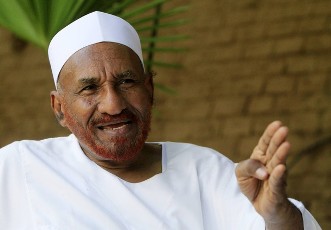Sudan’s NUP chief urges Khartoum & Juba to immediately implement cooperation agreement
March 11, 2013 (KHARTOUM) – The head of the National Umma Party (NUP), al-Sadiq al-Mahdi, called upon the two Sudans to abide by the implementation matrix on the cooperation agreement, saying that any further delay would negatively impact the people of the two countries.

The agreement set the period between 10-14 March to begin issuing orders to their respective forces to withdraw their troops from the DMZ.
After teetering on the brink of full-scale conflict last year during the worst border clashes since their split, the two countries had agreed in September to set up the buffer zone. However, they did not implement it.
Al-Mahdi said that his party maintains the need for the implementation of last year’s agreements on oil, free trade and freedom of pasture. He also called for institualisation of the four freedoms pact without delay and urged both sides to ignore the cries of what he called “parties of war” in Khartoum and Juba.
The former Sudanese prime minister also implored the two countries to refrain from embracing rebel groups from the other side and appealed to the African Union (AU) and the United Nations to set up a monitoring body to shut these camps down.
He pointed out that border disputes cannot be resolved bilaterally without consulting the local population nor through international arbitration. The opposition leader proposed establishing a Commission of Elders to engage all parties to the conflict and offer a timely and fair arbitral vision for all disputed borders issues.
Al-Mahdi said that priority should be given to negotiations with the Sudan People’s Liberation Movement-North (SPLM-N) and the Darfur rebel groups in order to achieve a just and comprehensive peace.
The violence in Blue Nile and another border state, South Kordofan, has strained relations between the two countries.
Khartoum accuses South Sudan of supporting the rebels, which Juba denies.
Al-Mahdi also urged all parties to agree on what he called “the national negotiations for the ratification of the just and comprehensive peace agreements and the program of full democratic transformation”.
In the same context, the Democratic Unionist Party (DUP) welcomed the security matrix agreement between Khartoum and Juba.
Ahmed Saad Omer, a leading DUP figure, asserted the importance of the agreement and its role in promoting security and economic stability and the strengthening of relations between the two countries.
The agreement, if adhered to, would be a major step toward resuming oil exports from landlocked South Sudan through pipelines in Sudan, which Juba shut off during a row over fees more than a year ago.
Both countries depended heavily on oil for revenue and the foreign currency they use to import food and fuel for their conflict-weary and impoverished populations.
(ST)
